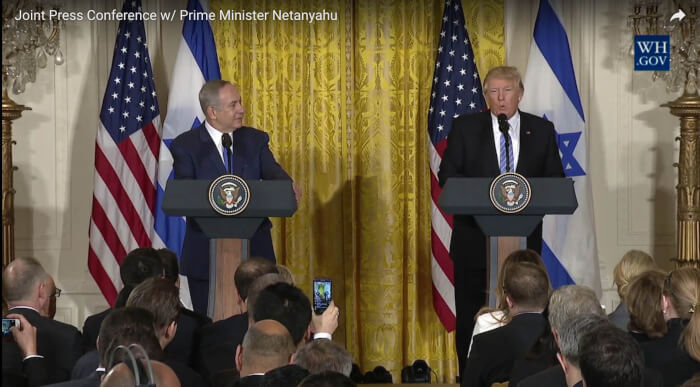Trump resists condemnation of Two-States, predicts peace deal
President Donald Trump held a press conference with Israeli Prime Minister Benjamin Netanyahu offering enthusiastic support for Israel and a stronger approach against threats from Iran, hesitation on campaign promises to move the U.S. Embassy from Tel Aviv to occupied Jerusalem, but wavered when pressed on the issue of abandoning the concept of the “Two State” solution. Netanyahu danced around Trump’s hesitation and used the press conference to reiterate hatred of Palestinians and repeat racist canards libeling Palestinian rights
By Ray Hanania
Although President Donald Trump and Israeli Prime Minister Benjamin Netanyahu presented themselves as close friends at a press conference in the East Room of the White House on Wednesday, the two seemed to have very different views on several critical issues.
The differences were coached in politeness, however, clearly an effort by Netanyahu to replace the more confrontational relationship that he had with Trump’s predecessor, President Barack Obama.
Yet despite the confrontations between Obama and Netanyahu, the tough stand under the Obama administration failed to yield any significant results in pushing Israelis and Palestinians closer to a final peace accord.
And while Trump did his best to be supportive and polite in disagreement with Netanyahu, there were disagreements that can’t simply be glossed over, especially on the issue of expanding Israeli settlements.
Trump told a room full of Israeli and White House reporters that he was determined to impose tougher sanctions of Iran, calling the nuclear deal worked out by Obama as “the worst deal I have ever seen.”
Trump explained “My administration has already imposed new sanctions on Iran, and I will do more to prevent Iran from ever developing — I mean ever — a nuclear weapon. Our security assistance to Israel is currently at an all-time high, ensuring that Israel has the ability to defend itself from threats of which there are unfortunately many. Both of our countries will continue and grow. We have a long history of cooperation in the fight against terrorism and the fight against those who do not value human life. America and Israel are two nations that cherish the value of all human life.”

Trump said his administration is committed both to Israel’s security and to the interests of “our common allies in the region towards greater security and stability. That includes working toward a peace agreement between Israel and the Palestinians.”
The President, in Netanyahu’s presence, added, “The United States will encourage a peace and, really, a great peace deal. We’ll be working on it very, very diligently. Very important to me also — something we want to do. But it is the parties themselves who must directly negotiate such an agreement. We’ll be beside them; we’ll be working with them. As with any successful negotiation, both sides will have to make compromises. You know that, right?”
The journalists in the room joined in the laughter by both Netanyahu and Trump, and Netanyahu added with a smile, “Both sides.”
Netanyahu tried to avoid the subject of making peace with the Palestinians, instead returning the discussion and responses to reporter’s questions to Iran.
“You call for confronting Iran’s terrorist regime, preventing Iran from realizing this terrible deal into a nuclear arsenal. And you have said that the United States is committed to preventing Iran from getting nuclear weapons. You call for the defeat of ISIS. Under your leadership, I believe we can reverse the rising tide of radical Islam. And in this great task, as in so many others, Israel stands with you and I stand with you.”
Pressed on the issue of settlements, Trump reiterated that he felt the settlements were not helpful to achieving a peace, something he has repeated many times before Netanyahu arrived to meet with the president on Wednesday morning.
“As far as settlements, I’d like to see you hold back on settlements for a little bit. We’ll work something out. But I would like to see a deal be made. I think a deal will be made. I know that every President would like to. Most of them have not started until late because they never thought it was possible. And it wasn’t possible because they didn’t do it,” Trump said.
“But Bibi and I have known each other a long time — a smart man, great negotiator. And I think we’re going to make a deal. It might be a bigger and better deal than people in this room even understand. That’s a possibility. So let’s see what we do.”
Netanyahu then turned to an Israeli journalist who seemed prepped to ask the questiont hat Netanyahu wanted to drive home to President Trump during the press conference, asking if Trump was ready to abandon the “Two-State” solution.
Trump, answered the question first, saying, “So I’m looking at two-state and one-state, and I like the one that both parties like. (Laughter.) I’m very happy with the one that both parties like. I can live with either one. I thought for a while the two-state looked like it may be the easier of the two. But honestly, if Bibi and if the Palestinians — if Israel and the Palestinians are happy, I’m happy with the one they like the best.”
Pressed on the issue of moving the U.S. Embassy from Tel Aviv to occupied Jerusalem, Trump added, “As far as the embassy moving to Jerusalem, I’d love to see that happen. We’re looking at it very, very strongly. We’re looking at it with great care — great care, believe me. And we’ll see what happens. Okay?”
Ignoring rising extremism and hate among Israelis, Netanyahu used the press conference to continue to libel the Palestinians and to reinforce racist stereotypes asserting that only the Palestinians have been “teaching” their children hate in Palestinian schools. Like most Israelis, Netanyahu has closed his eyes to evidence of increasing hatred against Palestinians being taught in Israeli schools and especially int he illegal and racist settlements.
Netanyahu used the racism to premise his pre-conditions on Palestinian.
“First, the Palestinians must recognize the Jewish state. They have to stop calling for Israel’s destruction. They have to stop educating their people for Israel’s destruction,” Netanyahu said.
“Second, in any peace agreement, Israel must retain the overriding security control over the entire area west of the Jordan River. Because if we don’t, we know what will happen — because otherwise we’ll get another radical Islamic terrorist state in the Palestinian areas exploding the peace, exploding the Middle East.”
Netanyahu also embarrassed the Arab World which for years has stood by the rights of Palestinians, basically saying that the Arab countries supported Israel’s demands for justice and suggesting that he expects them to turn their backs on the Palestinians when he said, “I believe that the great opportunity for peace comes from a regional approach from involving our newfound Arab partners in the pursuit of a broader peace and peace with the Palestinians.”
Netanyahu did not explain what a “broader peace” meant, but clearly based on his rhetoric in the past, he means turning Jordan into a Palestinian state and continuing Apartheid policies that would push Christians and Muslims out of territories that Israel is planning to annex in the occupied territories.
Yet despite the extremist rhetoric from a Netanyahu emboldened by the contrasting support from Trump that he did not receive from Obama, Trump remained focused on his message of supporting Israel, but forging a peace that both Israelis and Palestinians would support.
Although Netanyahu pushed back repeatedly on the issue of the illegal and racist Jewish settlements that have been built in violation of international law on lands forcibly confiscated from Christian and Muslim Arabs, Trump stayed focus on his own message that clearly contradicted Netanyahu’s expectations.
“I think that the Israelis are going to have to show some flexibility, which is hard, it’s hard to do. They’re going to have to show the fact that they really want to make a deal. I think our new concept that we’ve been discussing actually for a while is something that allows them to show more flexibility than they have in the past because you have a lot bigger canvas to play with. And I think they’ll do that,” Trump said.
“I think they very much would like to make a deal or I wouldn’t be happy and I wouldn’t be here and I wouldn’t be as optimistic as I am. I really think they — I can tell you from the standpoint of Bibi and from the standpoint of Israel, I really believe they want to make a deal and they’d like to see the big deal.”
Trump concluded, “I think the Palestinians have to get rid of some of that hate that they’re taught from a very young age. They’re taught tremendous hate. I’ve seen what they’re taught. And you can talk about flexibility there too, but it starts at a very young age and it starts in the school room. And they have to acknowledge Israel — they’re going to have to do that. There’s no way a deal can be made if they’re not ready to acknowledge a very, very great and important country. And I think they’re going to be willing to do that also.”
To read the entire transcript of the press conference, click here.
Click here to view a video of the press conference with President Trump and Prime Minister Netanyahu.


- Israelisnipers shooting and killing hospital workers in Gaza - December 11, 2023
- CAIR Condemns Israeli Executions of Wounded, Unarmed Palestinian in West Bank - December 11, 2023
- Arab and Muslim American voters face a “simple choice” between Biden’s inhumanity and Trump’s edgy politics - December 9, 2023
























